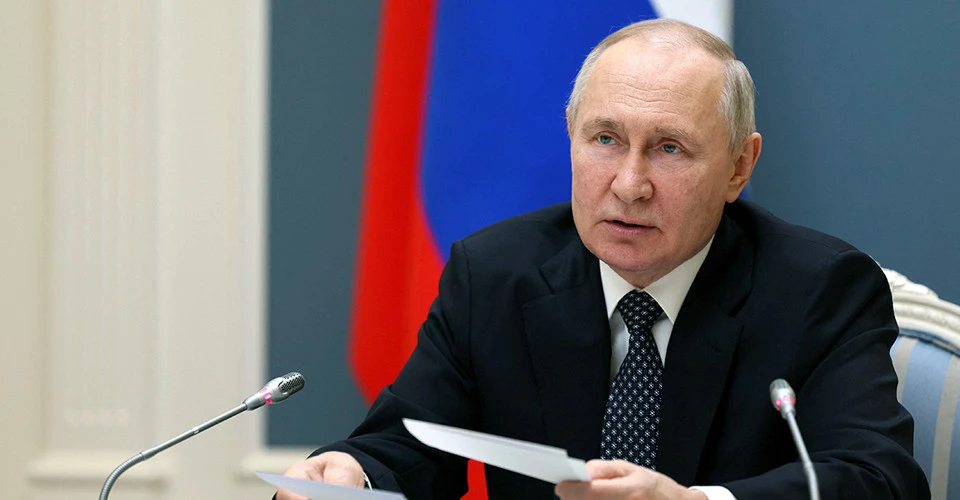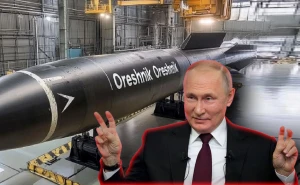
Putin considers immediate re-election, Wagner mutiny could be part of process – political scientist Tsybulko
Russian leader Vladimir Putin seeks re-election for another term, aiming to secure his position before potential economic collapse and setbacks inflicted by the Ukrainian Armed Forces agitate the broader Russian population
Political scientist Volodymyr Tsybulko shared his opinions with Espreso TV.
"A very interesting conflict arises as it appears that Putin lacks points for his re-election campaign scheduled for next March with the way the events unfold now. I have a feeling that this whole Prigozhin mutiny is about speeding up the circumstances in order to imitate an election campaign and hold it much earlier," he said.
According to Tsybulko, there is a reason why the Russian media have been promoting the statement of the Russian Central Election Commission Chairwoman Ella Pamfilova.
"This statement itself indicates that somewhere in the nooks and crannies of Putin's skull there is a scenario about holding presidential elections in Russia immediately to gain a foothold for another 7 years. It is not too late to hold them before the economic collapse and defeats by Ukrainian troops stir up the broad masses of the Russian population," the political scientist believes.
Prigozhin's mutiny in Russia
For several months, there has been a conflict between Yevgeny Prigozhin, the financier of Wagner PMC, and the Russian Ministry of Defense. However, the situation escalated quickly on the evening of June 23.
Allegedly, Russian troops launched a missile attack on the Wagner base. Yevgeny Prigozhin, the leader of the Wagner PMC, announced a "march of justice" and stated that 25,000 mercenaries were heading to Moscow after the Russian leadership refused to hand over Defense Minister Sergei Shoigu and Chief of the General Staff Valery Gerasimov.
On June 24, Wagner’s fighters took control of Rostov-on-Don, where they initially gathered around the headquarters of the Southern Military District, and then entered the city of Voronezh. Their convoys, which had diverted from the Ukrainian border, were moving towards Moscow. Military aircraft and artillery under Shoigu's control attempted to stop them. The units of Wagner PMC were last spotted in the Lipetsk region. In Moscow itself, defensive positions were established, trenches were dug, and all security forces were mobilized.
However, on the evening of June 24, the press service of the self-proclaimed President of Belarus, Alexander Lukashenko, released a statement in which the head of the Wagner PMC stated that he was ready to stop the advance of his mercenaries' military convoys, which were already approaching Moscow, and to reach an agreement with the Kremlin. Prigozhin allegedly agreed on this during a conversation with Lukashenko.
Instead, Prigozhin announced that the Wagner group had stopped their advance and returned to their field camps before reaching 200 km from Moscow. He stated, "In a day, we traveled without reaching 200 km to Moscow. During this time, no blood was shed. However, the moment may come when blood will be spilled. Therefore, taking full responsibility, we are turning our columns around and heading back to the field camps as planned."
Subsequently, Prigozhin and all his fighters left the headquarters of Russia's Southern Military District. Russian leader Vladimir Putin promised that Prigozhin would be able to go to Belarus, and Russia would close the criminal case against him.
On June 26, Russian media reported that the leader of PMC Wagner remained under investigation in the case of organizing a coup in Russia, despite the Kremlin's statements about closing the case.
On the same day, Putin gave a speech in which he offered the Wagner PMC fighters three options for future actions: join the Russian Defense Forces, go to Belarus with other PMC members, or return to their families.
Meanwhile, Wagner leader, Yevgeny Prigozhin, said that the main goal of the mutiny was "to prevent the destruction of the Wagner PMC, not to overthrow the government" and called it a "march of justice." He also claimed that the offensive on Moscow had stopped because the mercenaries "did not want to shed much blood."
On June 27, the Federal Security Service of Russia announced that it dropped the criminal case related to the armed plot, in which Wagner PMC leader Yevgeny Prigozhin was involved.
The Russian Ministry of Defense claimed that Wagner mercenaries would hand over heavy equipment to the regular Russian army.
On the same day, the self-proclaimed President of Belarus confirmed the arrival of Yevgeny Prigozhin in the country. According to him, the Wagner mercenaries who arrived with him would not guard the Russian tactical nuclear weapons stationed there.
The US alleges that Sergei Surovikin, the deputy commander of the Russian occupying forces, had prior knowledge of Yevgeny Prigozhin's plans to incite a mutiny in Russia. The Kremlin responded by dismissing the statement and saying that it was just "speculation."
On June 29, the FT wrote that the commander of the Russian Aerospace Forces and deputy commander of Russian troops in Ukraine, General Sergei Surovikin, could have been arrested following Prigozhin's failed coup. Russia and Surovikin’s daughter both denied the reports.
In an interview with the Washington Post on June 30, Ukrainian Armed Forces Commander-in-Chief Valeriy Zaluzhnyi said that due to the presence of Wagner PMC in Belarus, Ukraine may have to consider a new threat to its northern border and take appropriate measures.
- News














































